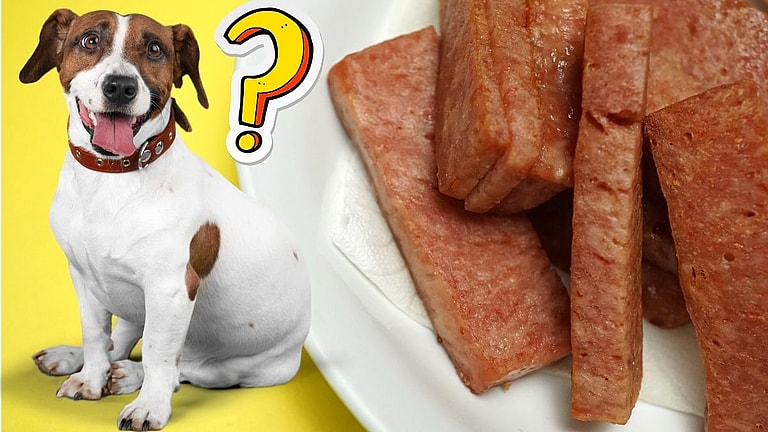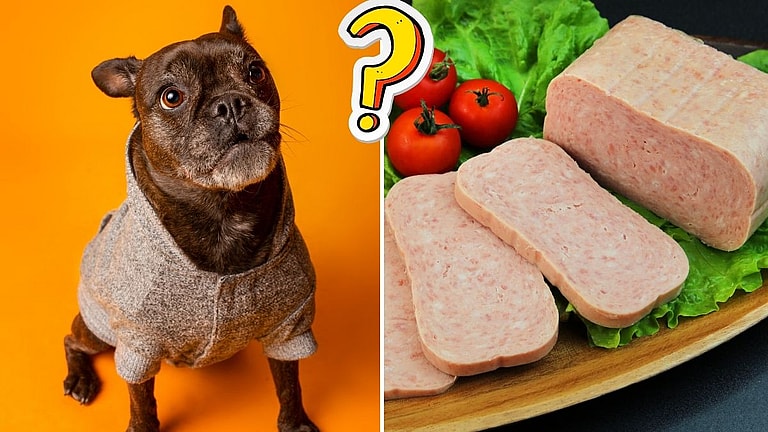Can Dogs Eat SPAM? What This Canned Classic Does to Their Health
SPAM is a shortened composite word that is rumored to come from the name “spiced ham,” though SPAM is free from both spices and ham. Invented in the 1930s, SPAM was an alternative to the large slabs of canned lunch meat consumers could buy portioned from their local delis. Today, SPAM looks almost identical to the SPAM of the 1930s, and is still made from a slurry of ground pork shoulder, water, and salt plus ingredients for binding and holding the product together.

Popular worldwide, SPAM is an especially common ingredient in Hawaiian households, in Alaska, the territory of Guam, and South Korea. A relatively affordable ingredient in the U.S., SPAM is also highly accessible and available at most grocery stores, gas stations, and corner markets. If you’re in a pinch, you can almost always find a can of SPAM.
If SPAM is such a convenient food for humans, could it also be a good option for your pets? Can dogs eat SPAM, or is this a product you should save for yourself?
The short answer is no, dogs shouldn’t eat SPAM, but there’s more to know if you want to understand exactly why processed meats like this one aren’t safe for canine consumption.
Why Shouldn’t Dogs Eat Spam? Health Risks & Considerations

SPAM has an extremely high sodium and fat content that could be harmful to dogs, particularly in large quantities. Even in small quantities, the high fat content can give your dog an upset stomach, and when combined with a high sodium content, it has a high risk of causing vomiting, diarrhea, and other GI upset.
If you were to purposefully feed your dog SPAM regularly, their diet would quickly lead to unwanted weight gain, heart disease, or even salt poisoning from the excess sodium. The large amounts of fat could cause health issues like pancreatitis, insulin resistance, and even diabetes.
Nutritional Content of Spam
While SPAM does contain protein, it isn’t the type of protein you should be feeding your dog. The pork used in SPAM has been heavily salted and is much higher in fat than any high-quality dog foods.
Here’s a quick breakdown of the nutritional content of two grams of SPAM:
| SPAM Classic Nutritional Content (per 2 grams) | |
| Calories | 180 |
| Total Fat | 16 g |
| Sodium | 790 mg |
| Total Carbohydrate | 1 g |
| Protein | 7 g |
Just 2 grams of SPAM has nearly all of a small dog’s daily recommended fat, and around 50% of their daily recommended sodium. Even a small piece of spam adds serious calories to your dog’s diet, and could completely unbalance their health particularly if your dog eats spam regularly.
Can Dogs Eat SPAM? FAQ

Can a dog eat SPAM as part of a balanced diet? The answer is a clear no, but what about different flavors of SPAM, or SPAM combined with other ingredients? Let’s take a look at some common questions from dog owners who want to know more about SPAM for dogs.
How much SPAM can a dog eat safely if they get some on accident?
If your dog gets just a small piece of SPAM, or even a decent sized chunk, they will likely be okay. Your dog may experience some tummy trouble like gas, vomiting, and diarrhea, but there should be no long-term effects. If your dog eats SPAM on accident you usually have nothing to worry about, just don’t start feeding them this processed meat on purpose.
Can dogs eat low-sodium SPAM?
No! Even low-sodium SPAM is still too high in fat and sodium for canine consumption, even in small amounts.
Can dogs eat cooked SPAM?
Can dogs eat SPAM meat if it’s cooked? No—cooking SPAM doesn’t change its nutrient content, and won’t make it any healthier for your dog.
Can dogs eat raw SPAM?
No. SPAM comes pre-cooked, and doesn’t technically need any preparation to make it safe to eat for humans. However, SPAM is never good for dogs, cooked or uncooked, so keep this treat for yourself.
Can dogs eat SPAM and eggs?
No. Adding additional ingredients to SPAM doesn’t make it healthier for dogs.



